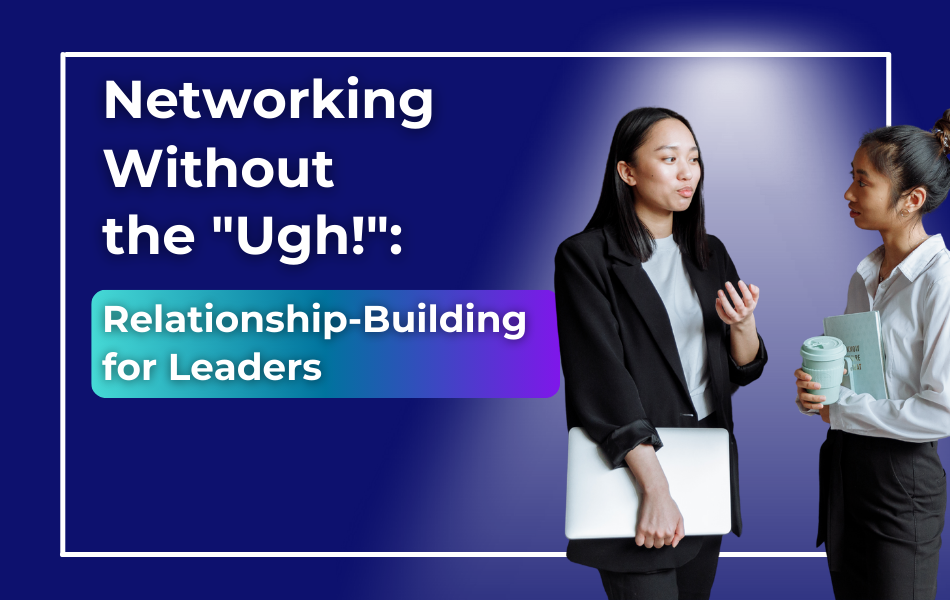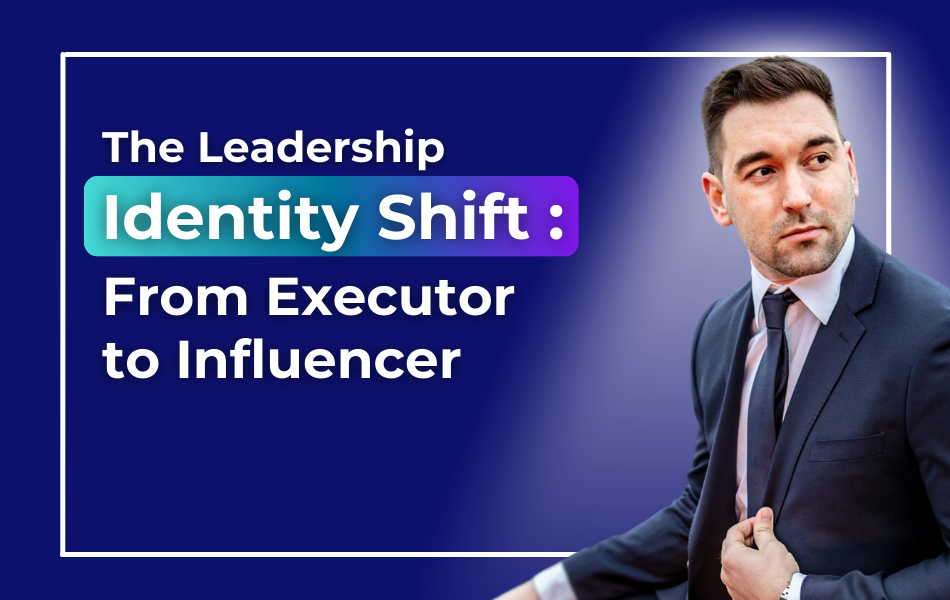
177. Emotional Labor
About this Podcast
Ep. 177 – Emotional labor, it’s that game face we put on when we have doubts, worries, or fears, but others expect confidence from us.
Let’s face it, that can be exhausting and draining.
But here’s the thing, if we ignore this emotional labor, it can lead to overwhelm, burnout, and loss of motivation.
There are ways to manage emotional labor effectively. In this episode, I’ll discuss the concept of “emotional labor” in the context of leadership and its implications, including the feeling of exhaustion, stress, and overwhelm it can cause as well as provide some practical tips to help manage the symptoms it can cause.
You can watch it on YouTube here: https://youtu.be/y7xAAb2SvXs
Action Steps:
- Recognize the emotional labor you’re exerting in your leadership role.
- Regularly reset and find ways to manage your emotional well-being.
- Determine where you can be more genuine and where you need to project certain emotions.
- Implement boundaries and practice compassionate detachment.
- Be self-compassionate and give yourself the grace to feel and process emotions.
Episode 177 Transcript:
Ramona Shaw [00:00:00]:
In this episode, we’re going to talk about emotional labor and specifically what that means for leaders and how that connects with overwhelm, stress, burnout, just a drain in energy or fatigue that many of us have experienced. It could be both direct reports or you personally as a leader and how emotional labor plays into that and how you navigate this. Well, here’s the question how do you successfully transition mission into your first official leadership role, build the confidence and competence to lead your team successfully and establish yourself as a respected and trusted leader across the organization? That’s the question and this show provides the answers. Welcome to the Manager Track Podcast. I’m your host, Ramona Shaw, and I’m on a mission to create workplaces where work is not seen as a source of stress and dread, but as a source of contribution, connection and fulfillment. And this transition starts with developing a new generation of leaders who know how to lead so everyone wins and grows. In the show, you’ll learn how to think, communicate, and act as the confident and competent leader you know you can be. Welcome to this episode of The Manager to Track Podcast.
Ramona Shaw [00:01:09]:
I mentioned in the introduction this is going to be about emotional labor. So, emotional labor. Before I dive any further into the topic, let’s give you a quick definition. First of all, this term, emotional labor was first introduced by sociologist Arlie Hoshield. And it essentially means that we as leaders have to sometimes put on a bit of a game face to project confidence when other people are expecting that, but when we may experience some doubts, some personal doubts, or some worries. Fears, concerns. In essence, it’s a way that we would manage emotions and feelings or express them in order to fulfill the expectations of the job or the expectations that other people have on us. And if you’re leading a team formally or informally, people and others are looking to you, or you have kids, you’re a parent, it could also be with other family members or spouses or partners or even friends.
Ramona Shaw [00:02:05]:
They sometimes expect you to be happy. They expect you to show up a certain way. They expect you to be confident, or you’re even paid to be confident about something, right? You know, that’s the role I’m playing right now. And you know that if you’re not feeling it at the moment, that this could be tricky, could be hard, and it can feel draining and exhausting to do this. Now when we’re looking at sort of the performances and we look at someone who’d be on stage delivering a keynote or at a conference, they are presenting something and it’s with a bit of a rah rah approach, right? They’re very enthusiastic, very energetic. And we’d know maybe they didn’t wake up this morning feeling that way, but that’s what they do. We go to a concert, we watch the artist on stage, and they may have gotten up and not felt good. I think remember Katy Perry, her ex broke up with her over text message right before her concert starts.
Ramona Shaw [00:02:59]:
But I’m laughing because it seems like such a weird situation to be . Winhen her boyfriend at the time, Russell Brand, it was, but imagining the situation where he sent her a text message breaking up and she has to like minutes later, she has to go on stage and perform a concert. She was putting on a show. Right? She was not feeling like it at the moment. We can all imagine this situation, but that is very short term, right. She had to get on there for 2 hours and then she could let it lose. But for leaders who are constantly watched, constantly in the eyes of others, people looking to them, whether you’re in an office or you work remote in your meetings all day, there is these performances when you’re not feeling it, they last all day and day after day and day after day. And that is where the labor part of the emotional labor term comes into play.
Ramona Shaw [00:03:47]:
Because it’s going to start feeling like labor. It’s going to start feeling like work that you have to put in to exhibit a different kind of emotion that you might feel. And this word has become more popular to talk about, which I think is a really important conversation to have. Thus we’re talking about it on this podcast, but also to recognize why this is happening. On one hand, expectations of what kind of support leaders provide has changed. It was from very directive, control and command kind of approach to morphing into leadership expectations that focus a lot more on the well being and the emotional and physical well being of employees that leaders hold. Right. That they feel like they have some kind of responsibility for, to make sure that their team members feel well, that they’re taken care of, that they feel confident, that they feel safe, that they feel included, that they feel supported and heard when they’re struggling.
Ramona Shaw [00:04:40]:
But there’s not really an outlet often for leaders to get that same level of support. They may talk to their manager every other week or once a month, right? But on a day to day basis, these leaders have to be there for their direct reports and other people in the organization and even upward as they’re talking to and as you may be talking to more senior leaders, you might have to project some kind of emotion. It’s not really how you feel now. I can’t change that. Obviously, we can talk about it and build awareness that, yes, expectations have are changing for leaders and have and will continue to do so. I don’t see an end in sight, really. If you look at data and trends that emerge with the integration of newer generations, that this will likely increase more so than decrease in the future. So that’s, one, the awareness of it, and then recognizing that, yes, this is normal, that we feel this way and that there is a labor component, that this may feel energy draining for leaders.
Ramona Shaw [00:05:36]:
Now, I can’t change the circumstances, but we can talk about what to do about it. So there are a few things that I want to highlight. One is, if you’re not recognizing it, or you’re not taking care of this emotional labor that you might experience, the chances are high that you at some point will start to feel depleted, maybe even burned out. You may have a loss of motivation and feeling a bit aimless or stuck, or just disinterested. If you are disinterested in a job or a thing that’s very different than overall, feeling disinterested in work or life or contribution or any of that would be signals that there is overwhelmed, stress, exhaustion that play into it, where we have to do a bigger reset. So instead of having to take six months off or do a drastic shift in what you’re doing to recover and feel that, umph, again, we’d want to do these resets on a more regular basis so they’re smaller resets, but then that becomes more sustainable. If you feel that way, this may be, hey, I’m going to implement a one day. I’m not taking maybe Wednesday, I have no meetings.
Ramona Shaw [00:06:46]:
And it’s all just about you. So you don’t have to perform in any way. You have one day a week where you can let that go, at least to a degree. Those are very tactical ways that you can shift and create some space for yourself. It may also be to recognize, where do I actually have to perform and where do I think I have to, but I don’t really have to. This is the conversation around vulnerability right there’s. The idea of being very vulnerable and authentic in the workplace. That means talking about the way that you feel, sharing openly if you have fears or worries or concerns, or at least how some people interpret it, which I disagree with.
Ramona Shaw [00:07:22]:
That you might feel drained and not feel like you’re not good enough, or you shouldn’t be so sensitive, or you shouldn’t get so involved. But really just be like, of course this is what I’m feeling, and of course this can feel draining. What do I do with this information? But be kind to yourself. Talk to yourself like you would want a friend or a partner to talk to you. I’m giving you some suggestions. One other suggestion that ties right into self compassion would be to practice compassionate detachment or emotional distancing. What that means is that sometimes we can get really wound up in someone else’s problems or emotional state. And we start to mirror their emotion.
Ramona Shaw [00:09:41]:
We actually start to feel what they’re feeling. Someone’s really sad, we can start to feel sad with them. When someone’s really angry or insecure, we can start to take that on. Emotional distance or compassionate detachment, as others call it, is this idea that you can see the emotion, but you don’t soak it up. So instead of being like a sponge that then feels those emotions too, like we’re mirroring someone else’s emotions, we’re soaking them up. Now I’m having to navigate these emotions internally while I’m supporting another person. We can create this compassionate distance or detachment where we’re looking at it. It’s like, I’m looking at the emotion that you have.That you might feel drained and not feel like you’re not good enough, or you shouldn’t be so sensitive, or you shouldn’t get so involved. But really just be like, of course this is what I’m feeling, and of course this can feel draining. What do I do with this information? But be kind to yourself. Talk to yourself like you would want a friend or a partner to talk to you. I’m giving you some suggestions. One other suggestion that ties right into self compassion would be to practice compassionate detachment or emotional distancing. What that means is that sometimes we can get really wound up in someone else’s problems or emotional state. And we start to mirror their emotion.
Ramona Shaw [00:10:23]:
I see it, I’m being present, but I’m not soaking it in. That works well. If you’re dealing with supporting other people, that may help you feel more grounded and like, you have to practice less of an emotional labor for yourself or emotional management. If you personally have to convey confidence when you’re not feeling like it, that won’t help in those situations. Just be self compassionate to know that this is labor, this may be hard, and then build in some time afterwards or a way that you can regenerate your energy or recoup from that emotional labor and recover often the biggest issue here is that we’re ignoring the fact that there’s emotional labor involved. And so we just are go go task after task. We avoid dealing with it. So we are suppressing the emotion.
Ramona Shaw [00:11:11]:
We’re not hearing it, we’re not taking care of it, we’re not recovering or rejuvenating from it. We’re not setting boundaries in place that would allow us to create a sustainable environment where we continue to feel good and instead we push through, we persevere, we try to be resilient and strong and that can backfire. So if, you know you have a tendency where you might feel overwhelmed or exhausted or even you’ve used the word burnout or feeling like about to burn out and you know this is happening for you, be really mindful of considering the emotional labor that you display and practice or apply and then how to take care of yourself in those smaller moments. I’m really good at suppressing my emotions and I’ll just dive right into work and I get really busy and I find it exciting. I love my work, I love working. And so it seems like a really easy way to quotation marks deal with my emotions, which I know now I’ve grown up and have matured. That is not actually dealing with emotions. That is suppressing my emotions and that will backfire.
Ramona Shaw [00:12:11]:
It includes over 67 minutes of Tactical Leadership Training plus a set of resources to make this as easy and immediately applicable for you as possible. You can either watch the video lessons or listen to it through a private podcast feed on your phone. You can get your hands on this course, which I want every single manager to have for a nominal $19 at Ramonashaw.com. One. One. That’s two times the number one. You can check the show Notes for the details or head on over to Ramonashaw.com Eleven to get started. Right now, emotions are really just signals and waves that go through your body.
Ramona Shaw [00:14:04]:
We feel them. It’s okay. We all have tons of different emotions. We don’t need to react on them. We don’t need to talk about all of them. We don’t need to act on them. We don’t need to respond to all of them. We just need to feel them.
Ramona Shaw [00:14:17]:
We feel them. We recover. We built breaks in or ways that we can make this more sustainable and that will set us up for stronger and more sustainable high performance. Again, as I’m wrapping this up, I shared a bunch of different ideas. Really, I think my main takeaway here and why I wanted to talk about emotional labor on the podcast today is that it’s underestimated. Leaders have to perform a lot of it and don’t recognize that that is weight, right? I often call talk about the pace of leadership or the pace of your work and the weight of it. The weight of it is the emotional labor or part of that. So be mindful for yourself about that emotional labor.
Ramona Shaw [00:14:54]:
Also be mindful of the emotional labor that your manager might have to perform and whether you are making it heavier or lighter for them. So that would be another question or even a conversation to have with peers or team members to look at what are ways that we can lighten that load. If you have any questions or want to chat more about emotional labor and what that looks like for you, check the links in the show notes. If you want to schedule a free strategy call, we can talk about what’s currently going on for you and in which ways I could potentially support you in building strong and sustainable high performance. That’s a wrap for today. I hope this was thought provoking and that you feel potentially validated or at least more aware of what you or even other leaders around you are experiencing and why sometimes this work can be and feel really heavy. Thank you for tuning in and we’ll be back next week with another episode of the Manager Track podcast. I’ll talk to you then.
Ramona Shaw [00:15:51]:
Ciao. Ciao. If you enjoyed this episode, then check out two other awesome resources to help you become a leader people love to work with. This includes my best selling book, The Confident and Competent New Manager, which you can find on Amazon or@ramonashaw.com Slash Book, and a free training on how to successfully lead as a new manager. You can check it out at ramona shaw.com. Masterclass these resources and a couple more you’ll find in the Show Notes down below.
Reflection & Discussion Questions:
- Reflection & Discussion Questions:How does emotional labor impact leaders and their ability to effectively lead their teams?
- What are the potential consequences of not addressing emotional labor in leadership roles?
- How can leaders incorporate regular resets or self-care practices to manage emotional labor? What are some tactical strategies leaders can implement to create space for themselves and let go of the need to perform?
- How can leaders foster a supportive environment where emotional labor is acknowledged and addressed?
Resources mentioned
- Schedule a Strategy Call with Ramona Shaw
- The concept of emotional labor introduced by sociologist Arlie Hochschild.
- Learn how to turn your 1-on-1 meetings from time wasters, awkward moments, status updates, or non-existent into your most important and valuable meeting with your directs all week. Access the course and resources here: ramonashaw.com/11
- Have a question or topic you’d like Ramona to address on a future episode? Fill out this form to submit it for her review: https://ramonashaw.com/ama
- Episode 16: How to Navigate Negative Emotions at Work
- Episode 43: Is Your Thinking Helping or Hurting You?
- Episode 68: Stop Feeling Responsible For How Other People Feel
- Episode 70: How to Deal With “Toxic” People at Work
- Episode 82: Leaders’ Exhaustion
- Episode 114: Burnout, Boundaries, and Saying “No” – With Teresa Vozza
Grab your copy of Ramona’s best-selling new book ‘The Confident & Competent New Manager: How to Rapidly Rise to Success in Your First Leadership Role’: amzn.to/3TuOdcP
If this episode inspired you in some way, take a screenshot of you listening on your device and post it to your Instagram Stories, and tag me @ramona.shaw.leadership or DM me on LinkedIn at linkedin.com/in/ramona-shaw
Are you in your first manager role and don’t want to mess it up? Watch our FREE Masterclass and discover the 4 shifts to become a leader people love to work for: ramonashaw.com/masterclass
Don’t forget to invest time each week to increase your self-awareness, celebrate your wins, and learn from your mistakes. Your career grows only to the extent that you grow. Grab your Career Journal with leadership exercises and weekly reflections here: ramonashaw.com/shop
Love the podcast and haven’t left a review yet? All you have to do is go to ramonashaw.com/itunes and give your honest review. Thanks for your support of this show!
* Disclaimer: Shownotes may contain affiliate links. That means that I am awarded a small commission for purchases made through them, at no added cost to you.
00:00 Introduction to emotional labor and its effects on leaders.
00:30 Role and expectations from a leader.
01:00 Definition and origin of the term “emotional labor”.
02:00 Expectations and projections in leadership roles.
03:00 Example of Katy Perry to illustrate short-term emotional labor.
04:00 Changing expectations from leaders over the years.
05:00 Awareness of emotional labor and its draining effects.
06:00 Ways to manage and recognize emotional labor.
07:00 The importance of self-awareness and setting boundaries.
09:00 Practicing self-compassion and emotional distancing.
11:00 Pitfalls of suppressing emotions and pushing through.







